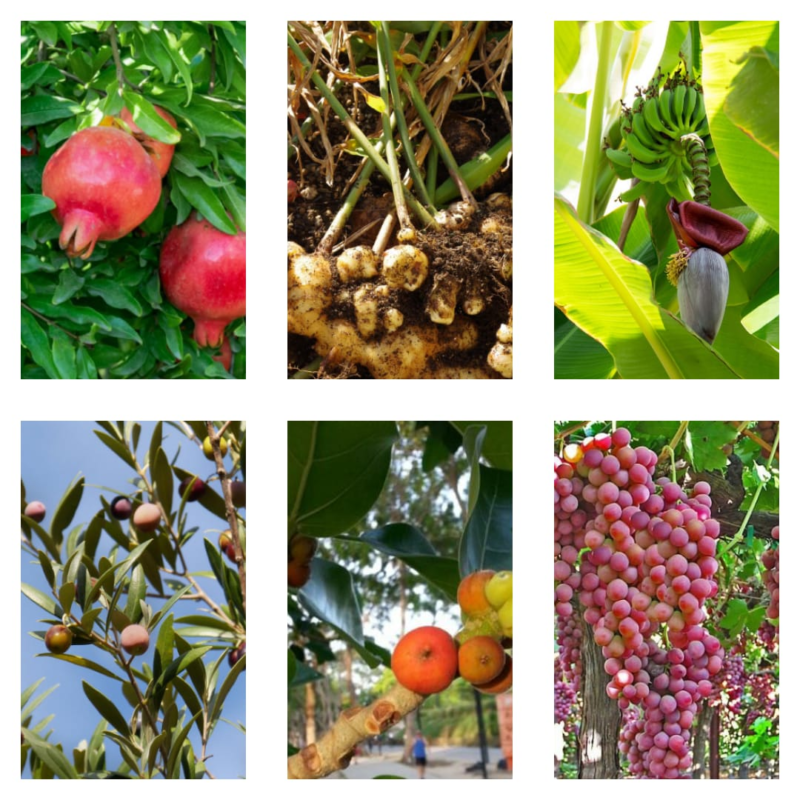Plants hold deep significance in Islamic teachings, symbolizing sustenance, healing, and divine blessings. The Quran mentions several plants, each carrying spiritual, medicinal, and ecological importance. This article explores these sacred plants, their meanings, and their relevance in modern life.
1.Olive (Zaitoon الزيتون)
The olive is a small tree that produces nutritious fruits and oil. It is widely grown in the Mediterranean and used in cooking and skincare.
Mentioned in: Surah An-Nur (24:35), Surah At-Tin (95:1)
The olive tree is a symbol of peace, light, and blessings. Its oil is widely used for health, while its fruit is a staple in Middle Eastern diets. Prophet Muhammad (PBUH) recommended olive oil for both consumption and medicinal use.
Benefits:
Rich in antioxidants and healthy fats
Boosts heart health
Used in skincare and medicine
2. Date Palm (Nakhl – النخل)
The date palm is a tall tree that produces sweet, nutritious fruits. It is widely grown in hot climates and used for food and medicine.
Mentioned in: Surah Maryam (19:25), Surah Al-An’am (6:99)
The date palm is deeply connected to Islamic history, as Maryam (AS) was advised to eat dates during childbirth. Dates are a Sunnah food, especially recommended for breaking fast during Ramadan.
Benefits:
High in energy and essential nutrients
Supports digestion and brain function
Strengthens immunity
3. Fig (Teen – التين)
The fig is a small tree that produces soft, sweet fruits. It is widely grown in warm climates and enjoyed fresh or dried.
Mentioned in: Surah At-Tin (95:1)
Figs are among the most nutritious fruits mentioned in the Quran. They are known for their healing properties and have been used in traditional medicine for centuries.
Benefits:
Improves digestion and gut health
Lowers cholesterol and blood sugar
Rich in vitamins and minerals
4. Pomegranate (Rumman – الرمان)
The pomegranate is a fruit-bearing tree that produces round, red fruits filled with juicy seeds. It is widely grown in warm climates and is known for its sweet and tangy flavor.
Mentioned in: Surah Ar-Rahman (55:68), Surah Al-An’am (6:99)
The pomegranate is described as one of the fruits of paradise. It is packed with antioxidants and has been revered for its health benefits.
Benefits:
Boosts heart health
Enhances skin glow and immunity
Contains anti-inflammatory properties
5. Grapes (Inab – العنب)
Grapes are small, juicy fruits that grow in clusters on vines. They are widely grown in warm climates and enjoyed fresh, dried, or as juice.
Mentioned in: Surah Al-Mu’minun (23:19), Surah An-Nahl (16:11)
Grapes are among the most widely cultivated fruits in history and were consumed by prophets for their numerous health benefits.
Benefits:
Supports brain and heart health
Rich in natural sugars and hydration helps in detoxification
6. Banana (Talh – الطلح)
The banana is a tropical fruit that grows in clusters on a tall plant. It is sweet, soft, and widely enjoyed fresh or in dishes.
Mentioned in: Surah Al-Waqia (56:29)
Bananas are described as one of the fruits of Jannah. They are an excellent source of natural energy and essential nutrients.
Benefits:
Improves digestion and muscle function
Provides instant energy
Rich in potassium and fiber
7.Bottle Gourd (Yaqteen – يقطين)
The bottle gourd is a vine-grown vegetable with a light green, smooth skin. It is widely used in cooking for its mild flavour and high water content.
Mentioned in: Surah As-Saffat (37:146)
The bottle gourd was provided by Almighty as a source of nourishment and healing for Prophet Yunus (AS) after he was
cast ashore. It is known for its cooling properties and is easy to digest.
Benefits:
Hydrating and detoxifying for the bodyAids digestion and supports weight management
Strengthens the immune system
8. Ginger (Zanjabil- زنجبيل)
Ginger is a spicy, aromatic root widely used in cooking and medicine. It has a warm, zesty flavor and is known for its health benefits.
Mentioned in: Surah Al-Insaan (76:17)
Ginger is described in the Quran as an ingredient in the drinks of Paradise, highlighting its significance in both spiritual and physical well-being. It has been used for centuries in medicine due to its strong healing properties.
Benefits:
Improves digestion and relieves nausea
Reduces inflammation and strengthens immunity
Enhances circulation and detoxifies the body
9. Lentils (Adas – عدس)
Lentils are small, lens-shaped legumes that come in various colors. They are widely used in soups, stews, and curries.
Mentioned in: Surah Al-Baqarah (2:61)
Lentils were part of the diet of Bani Israel and are known for their rich nutritional profile. They are a staple food that provides energy, sustenance, and nourishment.
Benefits:
High in protein and fiber for sustained energy
Supports heart health and lowers cholesterol
Regulates blood sugar and improves digestion
10.Pumpkin (Duba – دباء)
Pumpkin is a large, round vegetable with orange flesh and seeds. It is widely used in cooking, baking, and soups for its sweet and mild flavor.
Loved by Prophet Muhammad (PBUH)
Mentioned in: Surah As-Saffat 37:146
Pumpkin was a favorite food of the Prophet (PBUH) and is highly nutritious. It is known for its ability to boost immunity and overall health.
Benefits:
Rich in vitamins, especially Vitamin A, for eye and skin health
Strengthens the immune system and supports heart health
Aids digestion and promotes gut health
The Quranic plants are timeless gifts from Almighty, offering nourishment, healing, and blessings. In a world leaning towards artificial foods, embracing these natural remedies can reconnect us with both nature and faith.
The Divine Message Behind Quranic Plants
These plants are not just sources of food and medicine but also carry spiritual wisdom. They remind us of Almights generosity, encouraging a healthy and mindful lifestyle. By incorporating them into our daily diets, we align our physical well-being with divine wisdom.



